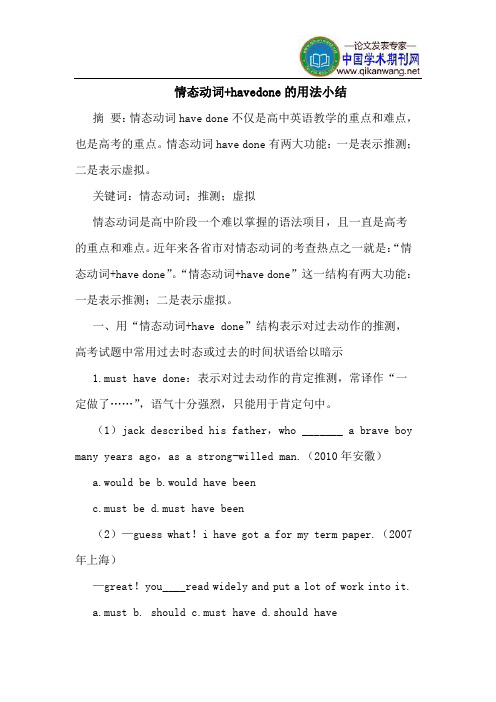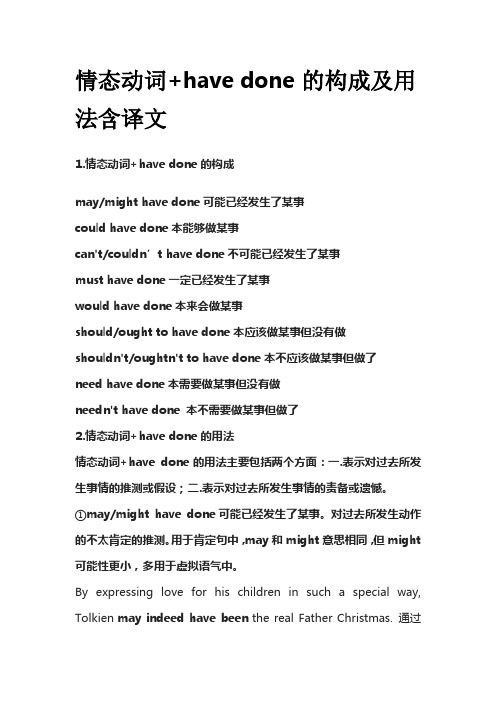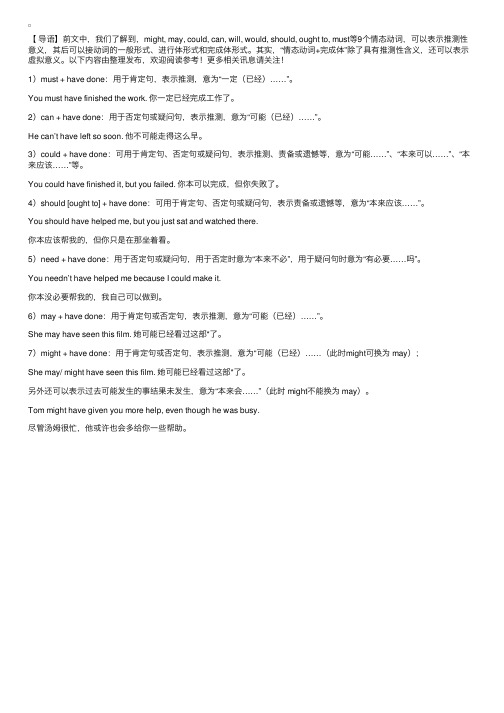小升初英语语法零基础 may have done用法小结
情态动词+havedone的用法小结

情态动词+havedone的用法小结摘要:情态动词have done不仅是高中英语教学的重点和难点,也是高考的重点。
情态动词have done有两大功能:一是表示推测;二是表示虚拟。
关键词:情态动词;推测;虚拟情态动词是高中阶段一个难以掌握的语法项目,且一直是高考的重点和难点。
近年来各省市对情态动词的考查热点之一就是:“情态动词+have done”。
“情态动词+have done”这一结构有两大功能:一是表示推测;二是表示虚拟。
一、用“情态动词+have done”结构表示对过去动作的推测,高考试题中常用过去时态或过去的时间状语给以暗示1.must have done:表示对过去动作的肯定推测,常译作“一定做了……”,语气十分强烈,只能用于肯定句中。
(1)jack described his father,who _______ a brave boy many years ago,as a strong-willed man.(2010年安徽)a.would beb.would have beenc.must bed.must have been(2)—guess what!i have got a for my term paper.(2007年上海)—great!you____read widely and put a lot of work into it.a.mustb. shouldc.must haved.should havekeys:d;c(注意:must have done只能表推测)2.may/might have done表示对过去的可能性推测“过去可能做了某事”,其程度小于must have done,一般也用于肯定句。
如:—i left my handbag on the train,but luckily someone gave it to the railway officials.—how unbelievable to get it back!i mean,someone _______ it.(2011年江苏)a.will have stolenb.might have stolenc.should have stolend.must have stolenkeys:b3.can/could (not)have done意思是“过去(不)可能做过某事”,常用于否定句和疑问句。
情态动词+havedone用法总结

情态动词+ have done的用法总结一、“must+have+done”表示对过去事情的肯定推测,译成“一定做过某事”,该结构只用于肯定句。
1. It must have rained last night, for the ground is wet. 昨晚一定下雨了,因为地面还是湿的。
2. You must have been mad to speak to the servant. 你和仆人说话,一定是发疯了。
二、“can't+have+done”表示对过去事情的否定推测,译成“不可能做过某事”。
1. Mr. Smith can't have gone to Beijing, for I saw him in the library just now. 史密斯先生不可能去北京了,我刚才还在图书馆见过他。
2. Mary can't have stolen your money. She has gone home. 玛丽不可能偷你的钱,她回家去了。
三、“can+have+done”表示对过去行为的怀疑,用于疑问句,译成“可能做过……吗?”。
1. There is no light in the room. Can they have gone out? 屋里没有灯,他们可能出去了吗?2. There is nowhere to find them. Where can they have gone? 到处找不到他们,他们可能到什么地方去呢?四、“could+have+done”是虚拟语气,表示对过去事情的假设,意思是本来能够做某事而没有做。
He could have passed the exam, but he was too careless. 本来他能够通过考试,但是他太粗心。
五、“may+have+done”表示对发生过的事情的推测,意思是“可能已经”或“也许已经”,用于肯定句中。
have done的用法

have done的用法一级标题:了解“have done”的基本用法和含义二级标题:"have done"的基本用法"have done"是英语中的一个常见短语,由助动词"have"加上动词的过去分词构成。
它通常表示在过去发生过的动作或事件,并与现在有关。
当我们使用“have done”时,需要根据句子的主语和时态来变换前面的助动词“have”。
主要有“has”,适用于第三人称单数形式(例如:he, she, it),以及“have”,适用于其他人称形式和复数形式(例如:I, you, we, they)。
以下是一些例句来说明其基本用法:1. I have done my homework.(我已经做完作业了)2. She has gone to the store.(她已经去商店了)3. We have finished the project.(我们已经完成了这个项目)二级标题:“have done”的现在完成时态另一个重要的使用场景是现在完成时态。
现在完成时描述先前发生但仍然与当前情况有关的动作或事件。
通常,使用"have/has + 过去分词"来构成这个时态。
以下是几个示例来展示如何正确使用现在完成时态:1. I have lived here for five years.(我已经住在这里五年了)2. Mark has visited Japan twice.(马克已经去过日本两次了)3. They have already seen that movie.(他们已经看过那部电影了)在现在完成时态中,常常会有时间状语词或短语来指示动作或事件的发生时间。
例如:since, for, just, already, yet, recently等常用于现在完成时句子中。
三级标题:“have done”的被动语态除了表示个人行为之外,"have done"也可用于被动语态。
情态动词+have done的构成及用法含译文

情态动词+have done的构成及用法含译文1.情态动词+have done的构成may/might have done可能已经发生了某事could have done本能够做某事can't/couldn’t have done不可能已经发生了某事must have done一定已经发生了某事would have done本来会做某事should/ought to have done本应该做某事但没有做shouldn't/oughtn't to have done本不应该做某事但做了need have done本需要做某事但没有做needn't have done 本不需要做某事但做了2.情态动词+have done的用法情态动词+have done的用法主要包括两个方面:一.表示对过去所发生事情的推测或假设;二.表示对过去所发生事情的责备或遗憾。
①may/might have done可能已经发生了某事。
对过去所发生动作的不太肯定的推测。
用于肯定句中,may和might意思相同,但might 可能性更小,多用于虚拟语气中。
By expressing love for his children in such a special way, Tolkien may indeed have been the real Father Christmas. 通过这种特别的方式表达对孩子们的爱,托尔金可能真的是真正的圣诞老人。
(新外研版必修二)You can check his office. He might have been there already. 你可以去他的办公室看看。
他可能已经到那儿了。
If he had been given more encouragement, he might have made greater progress. 如果给他更多的鼓励,他可能会取得更大的进步。
情态动词+havedone的用法小结

情态动词+havedone的用法小结作者:吕文娟来源:《新课程学习·上》2013年第03期摘要:情态动词have done不仅是高中英语教学的重点和难点,也是高考的重点。
情态动词have done有两大功能:一是表示推测;二是表示虚拟。
关键词:情态动词;推测;虚拟情态动词是高中阶段一个难以掌握的语法项目,且一直是高考的重点和难点。
近年来各省市对情态动词的考查热点之一就是:“情态动词+have done”。
“情态动词+have done”这一结构有两大功能:一是表示推测;二是表示虚拟。
一、用“情态动词+have done”结构表示对过去动作的推测,高考试题中常用过去时态或过去的时间状语给以暗示1.must have done:表示对过去动作的肯定推测,常译作“一定做了……”,语气十分强烈,只能用于肯定句中。
(1)Jack described his father,who _______ a brave boy many years ago,as a strong-willed man.(2010年安徽)A.would beB.would have beenC.must beD.must have been(2)—Guess what!I have got A for my term paper.(2007年上海)—Great!You____read widely and put a lot of work into it.A.mustB. shouldC.must haveD.should haveKeys:D;C(注意:must have done只能表推测)2.may/might have done表示对过去的可能性推测“过去可能做了某事”,其程度小于must have done,一般也用于肯定句。
如:—I left my handbag on the train,but luckily someone gave it to the railway officials.—How unbelievable to get it back!I mean,someone _______ it.(2011年江苏)A.will have stolenB.might have stolenC.should have stolenD.must have stolenKeys:B3.can/could (not)have done意思是“过去(不)可能做过某事”,常用于否定句和疑问句。
通过高考题精讲 may might have done的用法

通过高考题精讲may/might have done的用法may/might (not)have done的用法:1. 对过去的推测,表可能已经,只是might have done的可能性更低。
May have done通常用于肯定句和否定句中。
2. Might have done 还可用于虚拟语气,表过去应该做而没有做。
含责备或遗憾口吻。
(2008重庆) 30.——I can't find my purse anywhere.——You_______have lost it while shoppingA. mayB. canC. shouldD. would解析:本题选择A.may/might (not)have done对过去的推测,can have done一般用于否定和疑问句。
(2006天津) 11.We ______ have proved great adventurers, but we have done the greatest march ever made in the past ten years. A.needn’t B.may notC.shouldn’t D.mustn’t解析:本题选择B.May…..but….或许/可能。
但是。
是个固定句型。
(2007江西) 27.—Where is my dictionary? I remember I put it here yesterday. —You_________it in the wrong place.A.must putB.should have putC.might putD.might have put解析:本题选择D.may/might (not)have done对过去的推测,根据yesterday,是过去的事情,所以不用AC,should语气肯定。
(2008江西) 26.What a pity. Considering his ability and experience, he ____ better.A. need have doneB. must have doneC. can have doneD. might have done解析:本题选择D.Might have done 还可用于虚拟语气,表过去应该做而没有做。
英语语法:“情态动词+完成式”的用法

【导语】前⽂中,我们了解到,might, may, could, can, will, would, should, ought to, must等9个情态动词,可以表⽰推测性意义,其后可以接动词的⼀般形式、进⾏体形式和完成体形式。
其实,“情态动词+完成体”除了具有推测性含义,还可以表⽰虚拟意义。
以下内容由整理发布,欢迎阅读参考!更多相关讯息请关注!1)must + have done:⽤于肯定句,表⽰推测,意为“⼀定(已经)……”。
You must have finished the work. 你⼀定已经完成⼯作了。
2)can + have done:⽤于否定句或疑问句,表⽰推测,意为“可能(已经)……”。
He can’t have left so soon. 他不可能⾛得这么早。
3)could + have done:可⽤于肯定句、否定句或疑问句,表⽰推测、责备或遗憾等,意为“可能……”、“本来可以……”、“本来应该……”等。
You could have finished it, but you failed. 你本可以完成,但你失败了。
4)should [ought to] + have done:可⽤于肯定句、否定句或疑问句,表⽰责备或遗憾等,意为“本来应该……”。
You should have helped me, but you just sat and watched there.你本应该帮我的,但你只是在那坐着看。
5)need + have done:⽤于否定句或疑问句,⽤于否定时意为“本来不必”,⽤于疑问句时意为“有必要……吗”。
You needn’t have helped me because I could make it.你本没必要帮我的,我⾃⼰可以做到。
6)may + have done:⽤于肯定句或否定句,表⽰推测,意为“可能(已经)……”。
She may have seen this film. 她可能已经看过这部*了。
have done的用法总结

have done的用法总结
1. “Have done”可以表示过去已经完成的动作呀,就像“我已经写完作业了”,I have done my homework.
2. 当你想说“我已经吃过饭了”,这时候就可以用“have done”呀,I have eaten.
3. 岂不是很简单?你看“他已经去过北京了”,He has gone to Beijing. 这不就是“have done”的典型用法嘛!
4. 比如说“我们已经看过那部电影了”,We have seen that movie. 这就是在告诉别人这件事我们已经做完啦!
5. 还有啊,“她已经做完家务了”,She has done the household chores. 是不是很清楚呀?
6. 再想想“他们已经准备好了”,They have got ready. 这也是“have done”在发挥作用呢!
7. 哎呀,“我已经买了这本书”,I have bought this book. 多自然的表达呀!
8. 你看,“have done”的这些用法,是不是很实用呢?
总的来说,“have done”在各种情境中都能很准确地表达过去已经完成的事情,大家一定要掌握好呀!。
- 1、下载文档前请自行甄别文档内容的完整性,平台不提供额外的编辑、内容补充、找答案等附加服务。
- 2、"仅部分预览"的文档,不可在线预览部分如存在完整性等问题,可反馈申请退款(可完整预览的文档不适用该条件!)。
- 3、如文档侵犯您的权益,请联系客服反馈,我们会尽快为您处理(人工客服工作时间:9:00-18:30)。
小升初英语语法零基础:may have done用法小结
may/might have done 推测过去
“may/might+动词的完成式”表示对过去发生的行为的推测。
例如:
-Whatever has happened to George?
-乔治发生了什么事?
-I don't know. He may have got lost.
-我不知道,他可能迷路了。
You might have read about it in the papers.
你可能在报上已经看过这个消息了。
(之前我们做过can have done用法小结,can have done表推测时都是对过去进行推测,但是may have done不仅可以推测过去)
may/might have done 推测现在
“may/might+动词的完成式”表示对现在情况的推测。
例如:
She might have got up now.
现在她可能已经起床了。
may/might have done 预测未来
“may/might+动词的完成式”表示推测将来某时之前的情况。
例如:
He may have left when you get there.
等你到达的时候他可能已经离开了。
注意:may have done 和 might have done 表推测时,might 所表示的可能性比 may 小,语气较委婉:
How quickly time passed! It might have happened yesterday.
时间过得好快啊!这事好像就发生在昨天。
He might have seen the surprise in my face.
他或许已经看到了我惊异的表情。
might have done 表轻微责备
might have done 除了能够表推测,还能表示过去本来可以做而实际并没有做。
这时带有轻微的责备之意。
例如:
The proposal might have been refused.
这个建议本该拒绝的。
(有轻微的责备之意)
I might have taken another path.
我本可以走另一条路。
may not/mightn't have done 表“可能不”
之前我们讲到过 can't/couldn't have done 是表示“不可能”,而 may not/mightn't have done 则是表示“可能不”,要注意区分哦:
He can't have been at the meeting, he's on a business trip this week.
他不可能有出席会议,他这周出公差。
We couldn't have done it without you.
没有你我们肯定完成不了。
They may not have known it beforehand.
他们事先可能不知道这事儿。
They mightn't have regarded me as their friend.
他们可能没有把我当作朋友看待。
